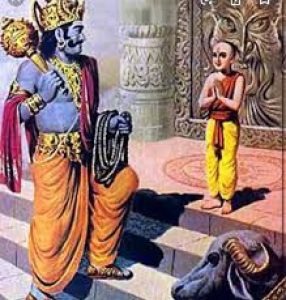Q: What is the scriptural basis for Advaita consciousness being an awareness preceding the universe? [(sic) From Quora]
A (Martin): That’s an ‘easy’ one. 1) Consciousness and awareness are the same for Advaita Vedanta. 2) Atman-brahman, or Consciousness, is the sole reality – the universe is in essence not other than Atman (Consciousness or ‘Spirit’). 3) Consequently, there is no creation – no causation, including space and time which, as everything else, are phenomena, appearances.
Mundaka Upanishad 2.1.10: ‘the world is brahman alone’.
Gaudapada kArikA 3.18: In this karika Gaudapada demonstrates that creation is only apparent, because reality cannot undergo change (and it is taught that the effect is not other than the cause).
Katha Up. 2.1.10: ‘Whoever sees difference between what is here (individual Atman/’soul’) and what is there (brahman) goes from death to death’.
Brihadaranyaka Up. 2.5.19: ‘The supreme being is perceived as manifold on account of mAyA’ (magic).
Taittiriya Up. 2.6: ‘Brahman, which is the absolute reality, became reality (satya) and unreality/appearance (asatya)’. That is, the cause itself appears as various effects due to superimposition, which is itself the core, or definition, of ignorance (avidyA). c.f. Tait. Up. 2.6, Chandogya Up. 2.8.4, and Bhavagad Gita 4.13 and 13.2.

 On the insistent questioning of the highly determined Naciketas, Lord Yama had no alternative but to reveal the secret code to ending the transient mortal world and realizing the “immortality” that one actually and already is. It is not some thing new that one acquires. It is prAptasya prAptiH (
On the insistent questioning of the highly determined Naciketas, Lord Yama had no alternative but to reveal the secret code to ending the transient mortal world and realizing the “immortality” that one actually and already is. It is not some thing new that one acquires. It is prAptasya prAptiH (